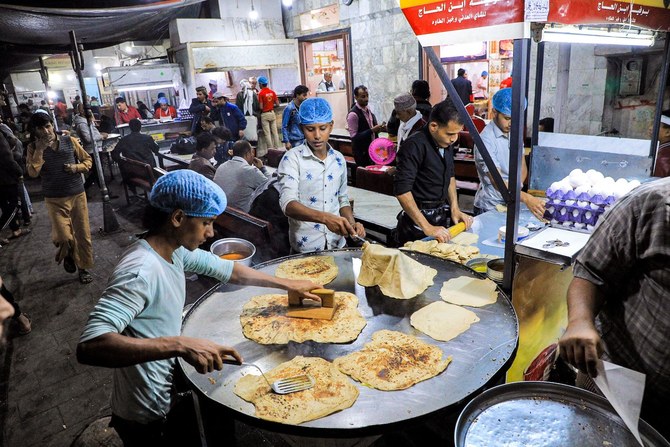AL-MUKALLA: Two UN bodies working in Yemen have accused the Iran-backed Houthis of abudcting two of their Yemeni workers in Sanaa, demanding their immediate release.
Audrey Azoulay, director general of UNESCO, and Michelle Bachelet, UN high commissioner for human rights, said in a joint statement that the Houthis abducted two workers early in November in Sanaa.
The militia subsequently rejected calls for information about the locations of the workers, they warned.
“OHCHR and UNESCO recall the privileges and immunities accorded to staff of the UN system under international law, which are essential to the proper discharge of their official functions, and call for the staff members’ immediate release without any further delays,” the two UN officials said.
In November, the US strongly condemned a Houthi raid on its embassy in Sanaa and the abduction of local workers, accusing the group of contradicting their promises to work for peace in Yemen.
The US Embassy in Sanaa has been closed since early 2015 when the Houthis tightened their grip on power after toppling the internationally recognized president and later expanding across Yemen.
The central city of Marib has been a key battleground for control of the country.
Yemen’s Defense Ministry said on Wednesday that dozens of Houthis were killed or wounded in heavy fighting with government troops outside the city.
Fighting broke out south and west of Marib as the Houthis mounted fresh attacks on government troops in a bid to seize control of a strategic mountain range with views of the city.
Warplanes from the Arab coalition conducted several air raids in the province, targeting Houthi military vehicles that were carrying fighters and weapons to the battlefields.
On Wednesday, a coalition warplane struck a military base controlled by the Houthis in Bayan district, in the southern province Shabwa.
The airstrikes came hours after two ballistic missiles fired by the Houthis ripped through the government-controlled Ataq airport in Shabwa, damaging infrastructure.
Meanwhile, basic commodity prices have fallen by about 40 percent this week in Yemen’s government-controlled areas as the riyal rebounded against the US dollar for the first time this year.
Boosted by fresh government policies and the reconstruction of the Central Bank administrative board, the Yemeni riyal achieved the biggest gains since early this year, surging to almost 770 against the US dollar this week, compared to 1700 earlier this month.
The riyal traded at 215 to the dollar in January 2015. The recovery of the riyal has prompted major industrial sectors to announce price slashing of vital products, including fuel, rice, flour and cooking oil.
The state oil company announced that the price of fuel is now 650 Yemeni riyals per liter, falling from 1200 several weeks ago.
Transportation prices have subsequently dropped by 50 percent, and food traders announced a decrease in prices for frozen chicken and other products.
The price of a 10 kilogram bag of rice fell from 19,000 riyals two weeks ago to less than 13,000 today, local grocery owners told Arab News.
The recovery of the riyal and subsequent drop in prices of food and fuel have sparked joy among Yemenis.
“The current prices are better than nothing. We demand more drops in prices,” said a government employee from the city of Al-Mukalla, the capital of Hadramout Governorate.
The Yemeni riyal began climbing against the US dollar on Dec. 6, hours after President Abed Rabbo Mansour Hadi reshuffled the Central Bank board, appointing a new governor and a deputy, and empowering a state-controlled auditing body to monitor and review the bank’s financial activities.
Within hours, the riyal rebounded to 1330.
Yemen Prime Minister Maeen Abdul Malik Saeed said this week that his government had “contained speculative activities by local money traders,” who have long been blamed for fueling the rapid depreciation of the currency.
The prime minister also said that the state oil company would handle imports and sales of fuel to the local market alone, a move aimed at curbing demand for the dollar by local oil traders.
Inspired by international support from regional and international donors to the government, the nationalization of oil activities is among many reforms introduced by the Yemeni government to steady the economy, including boosting revenues, punitive measures against violators of the central bank’s rule and fighting corruption.
“Boosting state revenues will reduce food and fuel prices,” the prime minister told a gathering of businessmen in Aden this week.
The skyrocketing prices of fuel, falling currency and power cuts repeatedly fueled unrest and union strikes across the government-controlled areas.
In September, three people were killed in Aden, Al-Mukalla and other cities when police clashed with people protesting against the plunging currency and crumbling public services.
The fall of the riyal also pushed many state-funded universities to closure as students could not afford transportation prices.
But despite the latest optimism, economists expressed concerns that the recovery of the riyal could be temporary, citing previous rebounds that were followed by rapid devaluation.
In December last year, the Yemeni riyal recovered by 20 percent, boosted by the news about the formation of a new government. But it subsequently tumbled to a historic low of 1,000 against the dollar despite the Central Bank closing dozens of local exchange offices and companies that violated its monetary rules.
Mustafa Nasr, director of the Economic Media Center, said that the new recovery of the riyal “is in response to anticipated financial support from international donors and enthusiasm about the new administration, not due to government measures.”
He added: “If we exclude the decision to limit the distribution of fuel to the state oil company, there are no practical measures that have enhanced the stability of the Yemeni riyal so far.”





















